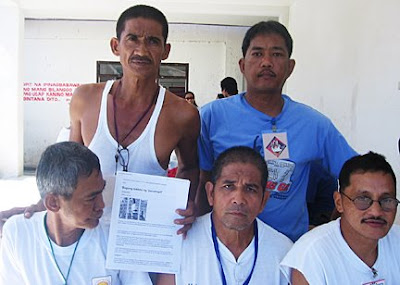|
Mass organizations across the Philippines and their allies around the world are condemning the persecution of legal democratic activists in the Southern Tagalog region by current Philippine President Gloria Macapagal Arroyo.
72 leaders of people’s organizations in the region have had false charges of multiple murder, multiple frustrated murder and arson slapped against them by the Inter-Agency Legal Action Group (IALAG), an agency created by Arroyo. 6 of the charged are currently being held in prison. The charges are an attempt to derail the people’s movement against Arroyo by keeping their leaders busy fighting legal harassment.
The accused are alleged to have participated in a raid carried out by the New People’s Army in Puerto Galera, Mindoro Oriental on March 3, 2006. The legal team for the accused called the charges ridiculous, saying that “the judge did not even bother to check if there was probable cause… There is not an iota of evidence.”
This new tactic is the third method that current Philippine President Gloria Macapagal Arroyo has adopted to try to cling to power. Widely despised for her corruption and electoral fraud, the Arroyo regime first tried to quell the opposition through targeted assassination of leaders in the people’s movement. Since coming to power in 2001, over 977 legal mass activists have been murdered by death squads that are mainly composed of military intelligence agents.
This tactic only further alienated the people and drew international condemnation, so the Arroyo regime switched to the method favoured by the Argentinian dictatorship of the 1970s: forced disappearances. Human rights organizations in the Philippines have documented 201 victims of enforced disappearances, where activist leaders would be snatched off the street by government agents, shoved into a vehicle and never seen again. Many were tortured and killed, their bodies hidden. The government would then deny ever having the victim in custody.
Fortunately for the people, nobody was fooled. The national and international outrage against the worst human right record of any Philippine government since the Marcos dictatorship only intensified. Unable to stifle the movement at home or the embarrassment abroad, the Arroyo regime is test driving the new tactic of harassment through false charges in the Souther Tagalog region. If it succeeds, it will be expanded across the Philippines.
“What the Arroyo regime could no longer accomplish through extra-judicial killings and abductions, it now tries to achieve through the filing of non-bailable criminal charges,” said Dr. Carol Pagaduan-Araulo, chairperson of Bayan. “The objective is clearly to neutralize the activist leaders by detaining them illegally or forcing them to go into hiding. At the same time, there is the intention to terrorize the remaining leaders, activists and the political mass base of progressive organizations and party-list groups.”
It is critical that people across Canada condemn the arrests in Southern Tagalog. The Arroyo regime is desperate to avoid the exposure of its crimes against the people and has shown that that it is vulnerable to international pressure. This tactic has already drawn criticism from the UN Special Rapporteur on extra-judicial, summary, or arbitrary executions, Philip Alston, who called on the Arroyo regime to abolish the IALAG. We call on everyone to raise this issue in their union, their church, with local politicians – anywhere where support for the rights of the Filipino people can be found. The Arroyo regime can and must be forced to respect human rights!
 These Southern Tagalog activists and one other have been imprisoned: Atty. Remigio Saladero, Nestor San Jose, Crispin Zapanta, Rogelio Galit, Arnaldo Seminiano, and Emmanuel Dionida. These Southern Tagalog activists and one other have been imprisoned: Atty. Remigio Saladero, Nestor San Jose, Crispin Zapanta, Rogelio Galit, Arnaldo Seminiano, and Emmanuel Dionida.
|